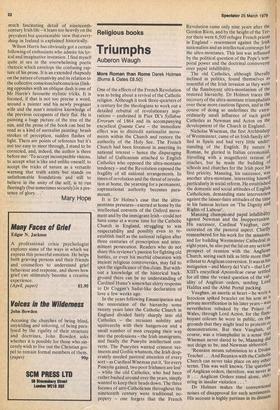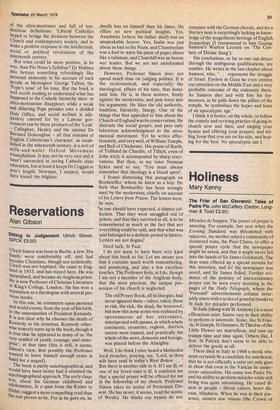Religious books
Triumphs
Auberon Waugh
More Roman than Rome Derek Holmes (Burns & Oates £8.50) One of the effects of the French Revolution was to bring about a revival of the Catholic religion. Although it took three-quarters of a century for the theologians to work out a detailed rebuttal of revolutionary aspirations — enshrined in Piux IX's Syllabus Errorum of 1864 and its accompanying encyclical Quanta Cura — the immediate effect was to discredit nationalist movements within the Church and restore the authority of the Holy See. The French Church had been foremost in asserting its national interest — hence the disparaging label of Gallicanism attached to English Catholics who opposed the ultra-montane tendency — and the Revolution exposed the fragility of all national arrangements. In times of revolution and the threat of revolution at home, the yearning for a permanent, supranational authority becomes paramount.
It is Dr Holme's case that the ultramontane pressures—exerted at home by the intellectual converts of the Oxford movement and by the immigrant Irish—could not have come at a worse time for the Catholic Church in England, struggling to win respectability and possibly even to reestablish itself as the national religion after three centuries of proscription and intermittent persecution. Readers who do not share this reviewer's passion for fighting old battles, or even his morbid obsession with ancient religious controversies, may fail to spot the significance of this claim. But with out a knowledge of the historical background there can be no understanding of Cardinal Hume's somewhat shirty response to Dr Coggan's Sadat-like declaration of love a few weeks ago.
In the years following Emancipation and the restoration of the hierarchy some twenty years later the Catholic Church in England divided fairly sharply into old Catholics — the recusant nobility and squirearchy with their hangers-on and a small number of men creeping their way into the professions — the Irish immigrants, and finally the Puseyite intellectual converts. The Puseyites wanted crimson ves tments and Gothic whatnots, the Irish desp erately needed pastoral attention of every sort as Cardinal Wiseman put it, 'for every Puseyite gained, two poor Irishmen are lost' — while the old Catholics, who had been rather bashed around over the years, simply wanted to keep their heads down. The three focuses of anti-Catholicism throughout the nineteenth century were traditional nopopery — one forgets that the French
Revolution came only nine years after the Gordon Riots, and by the height of the Terror there were 6,500 refugee French priests in England — resentment against the Irish nationalists and an intellectual contempt for the ultra-montanes. This last was inflamed by the political question of the Pope's temporal power and the doctrinal controversY over papal infallibility.
The old Catholics, although liberally inclined in politics, found themselves as resentful of the Irish invasion as they were of the flamboyant ultra-montanism of the restored hierarchy. Dr Holmes traces the recovery of the ultra-montane triumphalists over these more cautious figures, and in the course of doing so underlines the extraordinarily small influence of such great Catholics as Newman and Acton on the development of the Church in England.
Nicholas Wiseman, the first ArchbishoP of Westminster, came of an Irish family set' tied in Spain and had very little understanding of the English. By nature a Roman, he gloried in Italian ceremonial, travelling with a magnificent retinue of coaches, but he made the building of schools and churches for the Irish poor his first priority. Manning, his successor, was, another ultra-montane, interesting himself particularly in social reform. He established the domestic and social attitudes of English Catholicism, demanding state intervention against the laisser-faire attitudes of the time in his famous lecture on 'The Dignity and Rights of Labour'. Manning championed papal infallibility against Newman and the Inopportunists. His successor, Cardinal Vaughan, concentrated on the pastoral aspect. ChieflY remembered for his work for the missions, and for building Westminster Cathedral ill eight years, he also put the lid on any serious prospect of reunion with the Anglican Church, seeing such talk as little more than a threat to Anglican conversion. It was at his instigation — and Merry del Val's — that Leo XIII's encyclical Apostolicae curae settled for all time the vexed question of the validity of Anglican orders, sending Lord Halifax and the Abbe Portal packing. Vaughan, an ascetic at heart — he wore a ferocious spiked bracelet on his arm as a private mortification in his later years — was, nevertheless rebuked by the Prince ot Wales, through Lord Acton, for the flamboyant colours he wore in public, on the grounds that they might lead to protests or demonstrations. But then Vaughan, cif course, was a triumphalist in a sense that Wiseman never dared to be, Manning dici not deign to be, and Newman abhorred: 'Reunion means submission to a Divine Teacher. . . And Reunion with the Catholic Church can never take place on any other terms. This was well known. The question of Anglican orders, therefore, was never in it . . . Anglican Orders stand alone, shivering in insular violation . . . ' Dr Holmes makes the conventional noises of disapproval for such sentiments. His account is highly partisan in its distaste
of the ultra-montanes and full of tendentious definitions: `Liberal Catholics hoped to bridge the divisions between the Church and contemporary society, and to make a positive response to the intellectual, social or political revolutions of the nineteenth century.'
But what could be more positive, in its way, than Pio Nono's Syllabus? Dr Holmes also betrays something refreshingly like Personal animosity in his account of such People as Monsignor George Talbot, the 'Pope's nose' of his time. But the book is well worth reading to understand what has happened to the Catholic hierarchy since: as ultra-montanism disappears while a weak and dithering Pope presides over a divided Holy Office, and social welfare is adequately catered for by a Labour government run by three products of the `Leak' — Callaghan, Healey and the sinister Dr Bernard Donoughue — all that remains of English Catholicism's character, as established in the nineteenth century, is a sort of milk-and-water Oxford Movement triumphalism. It may not be very nice and it hasn't succeeded in saving Catholic state education, but at least it keeps Dr Coggan at arm's length. Newman, I suspect, would have kissed the blighter.



































 Previous page
Previous page